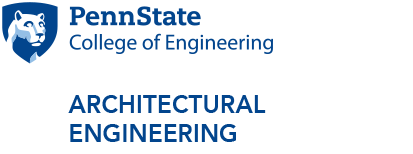Building Energy Solutions
Faculty in the Penn State Department of Architectural Engineering conduct fundamental research on building energy systems to improve their efficiency during regular operations and resilience against disruptions. Specific research topics include building energy management and controls; combined heat and power (CHP) systems, hybrid (CHP + Solar PV + Storage) distributed energy systems; optimized water-side free-cooling for data centers; smart grid operation; the application of microgrids for communities; cybersecurity of critical infrastructure; and sustainable energy transmission and distribution. They also study the installation, commissioning, and operation of microgrids and localized energy networks, as well as the control and optimization of renewable energy sources for buildings and communities.
Research lab focused on this research area:
Current and recent research includes the following:
(funding bodies in parentheses; Penn State architectural engineering faculty names bolded)
- Quantifying enhanced performance of passive houses over conventional buildings (Penn State Institutes of Energy and the Environment), Lisa Iulo, William Bahnfleth, James Freihaut, Corey Griffin, Ute Poerschke, Donghyun Rim
- Peer-to-peer energy transactions with demand flexibility for increasing solar energy utilization (QCoefficient, Inc. and U.S. Department of Energy), Greg Pavlak, Vince Cushing, Bill Hederman, Gregor Henze
- GraphUBEM: A graph-based urban building energy models for understanding the interdependency between buildings and supporting sustainable community planning (start-up funding), Yuqing Hu, Suhang Wang, Jianli Chen
- Mid-Atlantic combined heat and power technology center: (Energy Efficiency and Renewable Energy-Advanced Manufacturing Office, DOE) (Modeling and simulation of the energy efficiency and economic advantages of distributed energy systems for buildings and communities with a focus on specific site feasibility in the mid-Atlantic region), James Freihaut, W. Valentine, Greg Pavlak
- Optimizing the design of waterside economizers for data centers (U.S. Air Force), William Bahnfleth, Greg Pavlak
- U.S.-Ireland R&D Partnership: Intelligent Data Harvesting for Multi-Scale Building Stock Classification and Energy Performance Prediction (U.S. National Science Foundation, Science Foundation Ireland, the Department for the Economy in Northern Ireland), Wangda Zuo, James O’Donnell, Neil Hewitt
- Improving Data Center Energy Efficiency through End-To-End Cooling Modeling and Optimization (U.S. Department of Energy), Wangda Zuo, Michael Wetter, James VanGilder.
- Support for District Simulation with Modelica (U.S. Department of Energy via National Renewable Energy Laboratory), Wangda Zuo
- Development of Near-Optimal Control Sequence for Chiller Plants with Water Side Economizer Using Dynamic Models (American Society of Heating, Refrigerating and Air-Conditioning Engineers), Wangda Zuo
- Energy Modeling of Typical Commercial Buildings in Support of ASHRAE Building Energy Quotient Energy Rating Program (American Society of Heating, Refrigerating and Air-Conditioning Engineers), Wangda Zuo, Gang Wang
- Net Zero Energy Community (National Science Foundation, Department of Energy), Wangda Zuo.
- Developing Cost-effective BAS Integrable Occupant Centric Control Plug-in Package for Penn-State Facilities (Office of Physical Plant), Wangda Zuo
- Energy-Efficient Software for Data Center Cooling Optimization (Penn State Research Foundation), Wangda Zuo
- I-Corps: Translation Potential of an Innovative Cooling Software for Efficient Data Centers (National Science Foundation), Wangda Zuo
- Novel Fault Detection and Diagnostics Approach for Robust Design and Reliable Operation of Critical Cooling Infrastructure in Data Centers (National Science Foundation), Ardeshir Moftakhari, Rômulo Meira-Goes, Wangda Zuo
- Honeybee-Inspired Coordination & Control of Distributed Energy Resources for Resilient Electric Grids at the Distribution Level (National Science Foundation), Wangda Zuo, Kyri Baker, Orit Peleg, Kathryn Hinkelman, Raymond Kaiser
Research Areas
- Smart and Resilient Cities
- Indoor Environmental Quality, Human Health, and Productivity
- High-Performance Building Materials, Structural Systems, and Envelopes
- Building Energy Solutions
- Modeling, Simulation, and Diagnostics Under Uncertainty
- Automation, Robotics, and Digital Twins in Construction
- Engineering Education



